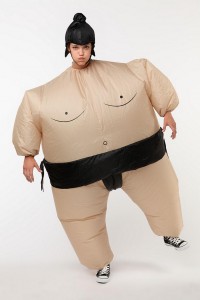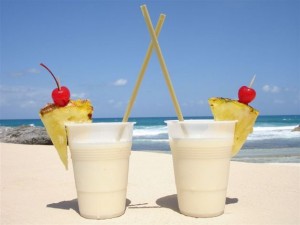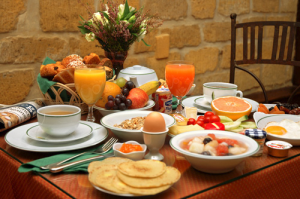Last week we regaled you with stories about how we crudely debauched our way to 10 lbs of weight gain in a week.
Through our cautionary tale you should have gleaned some ideas about what not to do, and some ideas about how to live a healthier life whilst partying like it’s 1999.
Now we’re going to tell you how we peeled all that weight off in a week. This installment will be a bit more technical, but all the juicy secrets to weight gain, weight loss, and avoiding weight gain are in here, so stay with us and take home some weight loss life lessons.
First, it’s important to note that we did not eat 5,000 more calories/day than we burned to gain the 10 lbs (5,000 kcal x 7 days = 35,000 kcal. 3,500 kcal = 1 lb of fat. Ergo, it would have taken 35,000 extra kcal to gain 10 lbs of fat), but we gained the weight even still. Some would point to this as evidence that “a calorie is not a calorie.” This is an oversimplification that derails many a diet. A calorie is (obviously) a calorie. However, what we ingest is only half of the energy balance equation. The other half is how many calories we burn. Some of the calories are burned during activity and exercise, which is a crucial part of the balance, but most, yes, most are burned by our bodies’ internal processes while we are inactive (properly designed exercise can increase how many calories we burn at rest, but that is another topic for another article).
So what happened? We didn’t eat 35,000 more calories last week. Instead, we swung the way our bodies would use and respond to the food we ate. Our bodies responded to more than just the total number of calories ingested. They actually started burning fewer and storing more of the macronutrients we consumed. They responded to the sudden change in micronutrient consumption and stored water in aesthetically unpleasant places. They got mildly inflamed. The point being, there was no single factor that caused the sudden weight gain. Instead it was the accumulation of factors.
Now, onto the good stuff… The weight loss.
Here’s the short version of how we lost the weight: we went right back to doing what we always do. We went back to a nutritionally dense, meat and vegetable based diet. We went back into a training program of soft tissue, movement, power, and strength work. We ate tons of food and lifted tons of tons. We upped the ante by cutting out booze and cheat meals for the week.
But, since the devil’s in the details and since “We did what we always do” is a bit of a cop out, here’s the full story of why what we did worked:
The Food:
If you read our articles regularly, you are already aware that our diet is higher in fat, higher in protein, full of fruits and vegetables, lower in carbohydrates, and essential devoid of processed foods. We returned to this diet as soon as our plane touched back down in New York City. There are lots of advantages to this style of eating:
The high vegetable and fruit content ensures that we’re getting lots of phytonutrients, micronutrients, and fiber, while helping to buffer the acid load of other foods. In essence, we get to eat a silly amount of food and improve our total health simultaneously.
The high protein content, which comes primarily from animal products, ensures that we’re getting plenty of the essential amino acids and sulfur containing amino acids, will have efficient tissue repair, and are eating a macronutrient that is hard to turn into bodyfat and helps to regulate blood sugar. In essence, we will build or retain important lean tissue while battling back the bulge.
The diet is higher in fat partially because it is lower in carbohydrates and partially to ensure that we’re getting plenty of the essential fatty acids and that our endocrine function is good (very little works properly in your body if you’re low on fats). In essence, your diet should not be all protein, and fat is a crucial nutrient that is inappropriately vilified by the media and certain doctors (but not in the research which pretty clearly states that fats, yes, even most saturated fats from animals, are not bad for you). It goes without saying that trans-fats are (generally) not only not real fats, they’re not food, so put down the sugar-free cookies.
The diet is relatively low in carbohydrates because our lifestyle doesn’t require a ton of carbohydrates. We only exercise 4 to 5 hours per week, and while we work on our feet and walk more than the average American, we don’t perform a great deal of heavy labor. 4-5 hours per week of structured training, standing, and some daily walking still means that we’re moderately sedentary. In essence, high carbohydrate diets are typically only appropriate for the extremely active, and that’s just not us.
To get healthy and lose weight we went high protein, higher fat, high veg, lower carb. We also cut out our cheat meals for the week instead of cheating 10% of the time.
The Alcohol:
Alcohol affects the system in a few ways.
- It is an extra source of dense calories of limited value, much like sugar.
- It increases the likelihood that other foods will be stored as fat. The body will choose to burn alcohol first, so your other fuel sources take a back seat. Easier to store fuel sources, like carbs and fats, are often consumed with alcohol, which isn’t making things any better.
- It negatively affects sleep patterns, tissue turnover, and inflammation, all of which spell let’s get fat.
To stem the tide we cut out alcohol for the week. Our livers rejoiced, you know, for the week.
Vegetable and Fruit intake:
This went down while we were on vacation. This is important for two reasons:
- We didn’t just cut down the veg and fruit intake, we replaced it with rice, tortillas, beans, desserts, juices, etc. These foods are denser in calories, but significantly less nutritious. Total horror show.
- We didn’t replace the forgotten fruits and vegetables with potassium rich foods. This impacts sodium-potassium balance, causing water retention — typically a more rapid impact on weight gain and appearance than actual lipogenesis (fat gain).
We eat a scary amount of vegetables. Meals always leave us satisfied (often stuffed), our bodies get great nutrition, we melt fat like butter in a hot pan, and, because of all the potassium rich veg/fruit, we drop subcutaneous water (AKA, bloat) even while on a relatively high sodium diet.
To get back on track, we jacked up the vegetable and fruit intake. Starving and weight loss don’t coexist well in most cases. We get lean by stuffing our faces.
Carbohydrate Intake:
As we mentioned, while getting fat and tan we totally replaced good foods with grains and processed foods (e.g., taco shells, juices, breads, etc). These are all relatively low in nutrition, while being high in carbs. The carbs you store wind up in one of two places:
- Glycogen stores in the liver and muscles
- Fat suit
Muscle and liver glycogen are important sources of stored fuel, especially during exertion (we were in low-exertion-mode). While about three grams of water are stored with each gram of glycogen, this kind of water storage is very different from the subcutaneous “water retention” most people think of. In fact, it can make your muscles look more full, increasing the appearance of “tone”. That aside, filling up glycogen stores can result in some weight (not fat) gain, particularly if you carry more muscle. Once those stores are filled any macronutrients you’re not using are going to be converted to fat, just like overfilling a cup. The combination of filled glycogen stores and a higher carb diet adds up quickly. Making matters worse, a higher carb diet will signal more storage hormones and reduce lipolysis (getting un-fat).
We may not have eaten radically more calories while on vacation, but we did eat a higher ratio of carbs to protein. To get back to fat burning, we went back to our regular diet, dropped some water weight, and re-engaged in lipolytic goodness while limiting cravings.
The Take-Home Points:
- Stick to a general plan: Getting and remaining lean is about having a plan you stick with 90% of the time. For us, being only moderately active, that’s a lower carb, high protein, higher fat, high veggie diet. This isn’t a restrictive diet where only certain foods or meals are allowed, but instead is a general plan for how to eat that lots of different foods and meals fit into. We stay lean, don’t have crazy cravings, have energy to workout and to work with people all day, avoid swings in blood sugar (which, by the by, reduces the likelihood you will be moody, mentally cloudy, depressed, have anxiety, develop an addiction, be forgetful, or have trouble learning new things), and are unusually healthy (as measured objectively by blood work, and subjectively by being energetic and rarely ill).
- Be Prepared: We were physically and mentally prepared for what was going to happen during and after our extravaganza. We trained hard until we left and scheduled our training so we would deload and supercompensate while on vacation. We were prepared to gain weight and to lose it upon returning. We were psychologically prepared to gain weight while away and were still comfortable hitting the beach even though someone had stolen some of our abs. Afterwards, we were psychologically ready to go back to normal upon returning because we enjoyed ourselves and were armed with the appropriate knowledge to avoid freaking out.
- Calorie intake is only a part of the equation: You can modulate your body composition, response to food, appearance, and health by increasing your veg (and probably your fruit) intake, keeping a high protein intake, enjoying lots of quality dietary fats (yes, including animal fats and other saturated fats), and eating better carbs more moderately.
- Processed foods are not your friend. You know this already, but remember, juices and breads have been through processing, even if they are not always thought of as “processed.”
- Alcohol has a negative impact on the physique, and it gets worse if you drink excessively. We enjoy our drinks but attempt no justifications. The facts are the facts and there’s really no silver lining.
Take lessons from our cautionary tale and our triumphant return to normalcy. If you’re struggling with your diet, there’s a good chance the answer is somewhere in here. If it’s not, get in touch with us. We (mostly) don’t bite.
Get notifications when we publish awesome new articles and content for the website (this is the only thing we will use your information for), please sign up for the newsletter.



